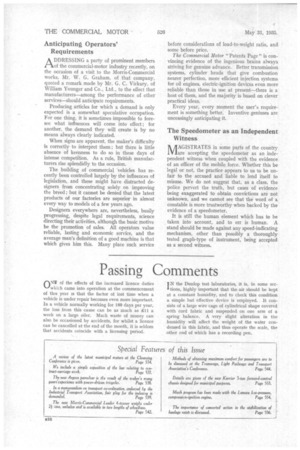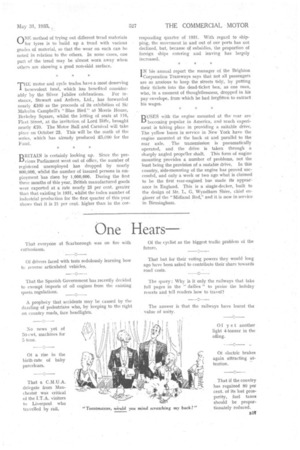Passing Comments
Page 34

Page 35

If you've noticed an error in this article please click here to report it so we can fix it.
n.VE of the effects of the increased licence duties ‘--/which came into operation at the commencement of this year is that the factor of lost time when a vehicle is under repair becomes even more important. In a vehicle normally working for IN days per year, the loss from this cause can be as much as £11 a week on a large oiler. Much waste of money can also be occasioned by accidents, for whilst a licence can be cancelled at the end of the month, it is seldom that accidents coincide with a licensing period.
T.N the Dunlop test laboratories, it is, in some sec." tions, highly important that the air should be kept at a constant humidity, and to check this condition a simple but effective device is employed. It consists of a large wire cage of cylindrical shape covered with cord fabric and suspended on one arm ot a spring balance. A very slight alteration in the humidity will affect the weight of the water condensed in this fabric, and thus operate the scale, the other end of which has a recording pen.
ONF, method of trying out different tread materials for tyres is to 'build up a tread with various grades of material, so that the wear on each can be noted in relation to the others. In sonic cases, one part of the tread may be almost worn away when others are showing a good non-skid surface.
THE motor and cycle trades have a most deserving benevolent fund, which has benefited consider ably by the Silver Jubilee celebrations. For instance, Stewart and Ardern, Ltd., has forwarded nearly £160 as the proceeds of its exhibition of Sir Malcolm Campbell's "Blue Bird" at Morris House, Berkeley Square, whilst the letting of seats at 116, Fleet Street, at the invitation of Lord Iliffe, brought nearly £70. The Motor Ball and Carnival will take place on October 23. This will be the ninth of the series, which has already produced £5,000 for the
Fund.
nR1TAIN is certainly looking up. Since the pre
vious Parliament went out of office, the number of registered unemployed has dropped by nearly 800,000, whilst the number of insured persons in employment has risen by 1,000,000. During the first three months of this year, British manufactured goods were exported at a rate nearly 25 per cent. greater than that existing in 1931, whilst the index number of industrial production for the first quarter of this year shows that it is 21 per cent. higher than in the cor responding quarter of 1931. With regard to shipping, the movement in and out of our ports has not declined, but, because of subsidies, the proportion of foreign ships entering and leaving has largely increased.
TN his annual report the manager of the Brighton I Corporation Tramways says that not all passengers are so anxious to keep the streets tidy, by putting their tickets into the dead-ticket box, as one man, who, in a moment of thoughtlessness, dropped in his pay envelope, from which he had forgotten to extract his wages.
BUSES with the engine mounted at the rear are becoming popular, in America, and much experiment is taking place in providing a suitable drive. The yellow buses in service in New York have the engine mounted at the back of and parallel to the rear axle. The transmission is pneumatically operated, and the drive is taken through a sharply angled propeller shaft. This form of engine mounting provides a number of problems, not the least being the provision of a suitable drive. In this country, side-mounting of the engine has proved successful, and only a week or two ago what is claimed to be the first rear-engined bus made its appearance in England. This is a single-decker, built to the design of Mr. L. G. Wyndham Shire, chief engineer of the " Midland Red," and it is now in service in Birmingham.




































































































